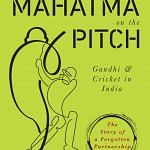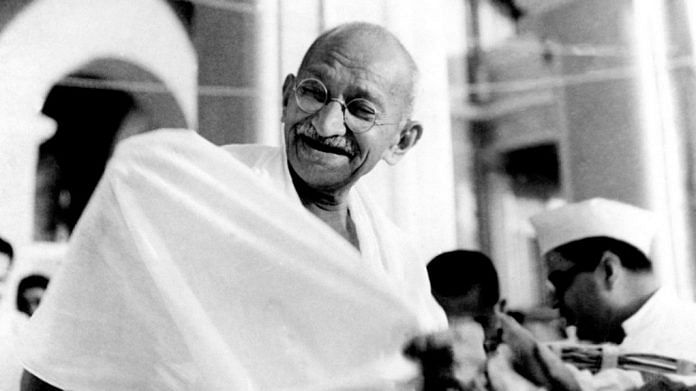Mahatma Gandhi was once asked if a cricket tournament should be allowed to go on and his answer showed how why he ended up influencing the sport at the time.
Mahatma Gandhi never played cricket except in his childhood. But he had a profound influence on how cricket and cricket politics evolved in its formative years in India.
 The forthcoming book ‘Mahatma On The Pitch: Gandhi & Cricket in India by Kaushik Bandyopadhyay’ explores the nature of relation between India’s most iconic political figure and a game which enjoys immense popularity.
The forthcoming book ‘Mahatma On The Pitch: Gandhi & Cricket in India by Kaushik Bandyopadhyay’ explores the nature of relation between India’s most iconic political figure and a game which enjoys immense popularity.
An edited excerpt:
His verdict on the Pentangular cricket, aptly described as ‘his most direct, considerate and consequential intervention in the world of cricket, deserves reproduction in full:
Numerous inquiries have been made as to my opinion on the proposed Pentangular Cricket Match in Bombay advertised to be played on the 14th. I have just been made aware of the movement to withdraw from the match, I understand, as a mark of grief over the arrests and imprisonment of satyagrahis, more especially, the recent arrests of leaders. A deputation of three representatives of the Hindu Gymkhana have also just been consulting me as to what their attitude should be. I must confess ignorance of these matches and of the ‘etiquette’ governing them. My opinion must, therefore, be taken as of a layman knowing nothing of such sports and special rules governing them.
But I must confess my sympathies wholly with those who would like to see these matches stopped. I express this opinion not merely as a satyagrahi desirous of getting public support in some way or other for the movement. I must say at once that the present movement is wholly independent of such demonstrations or adventitious support. But I would discountenance such amusements at a time when the whole of the thinking world should be mourning over a war that is threatening the stable life of Europe and its civilization and which bids fare to overwhelm Asia. I would rather that all those who are blessed with intelligence and opportunity devoted both to devising means of stopping what appears to be senseless slaughter. It is like an ill wind which blows nobody any good. And holding this view I naturally welcome the movement for stopping the forthcoming match from the narrow standpoint I have mentioned above.
Incidentally I would like the public of Bombay to revise their sporting code and erase from it communal matches. I can understand matches between colleges and institutions, but I never understood reasons for having Hindu, Parsi, Muslim and other communal Elevens. I should have thought that such unsportsmanlike divisions would be considered taboos in sporting language and sporting manners. Can we not have some field of life which cannot be touched by the communal spirit?
I should like, therefore, those who have anything to do with this movement to stop the match, broaden the issue and take the opportunity of considering it from the highest standpoint and decide once for all upon banishing communal taints from the sporting world and also deciding upon banishing these sports from our life whilst the blood-bath is going on.
I say this in fear and trembling and with apologies to Mr Bernard Shaw and others who think that a nation’s amusements must not be interrupted even while its flower of manhood is being done to death and is engaged in doing others to death and in destroying the noblest monuments of human effort.
This statement was followed by another small dictum when Bhalerao, the secretary of the Bombay Hindu Cricket Club, in a telegram dated 11 December 1940, asked Gandhi ‘whether he wanted only Hindus to boycott the Pentangular cricket matches’. Gandhi replied categorically: ‘ALL WHO HOLD MY OPINION MUST REFRAIN WHETHER FEW OR MANY.’
(Excerpted with permission from Rupa Publications)






